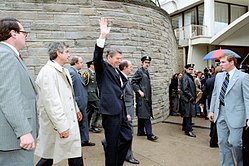This article needs additional citations for verification .(June 2010) |
 Bodyguards with President Ronald Reagan moments before he was shot and almost killed in late March 1981 | |
| Occupation | |
|---|---|
| Names | Close protection officer, executive protection agent, personal protection specialist |
Occupation type | Government employment or private employment |
Activity sectors | Law enforcement, government, military, security |
| Description | |
Related jobs | Security guard, law enforcement officer, anti-terrorism specialist, intelligence officer |
A bodyguard (or close protection officer/operative) is a type of security guard, government law enforcement officer, or servicemember who protects an important person or group of people, such as high-ranking public officials, wealthy businesspeople, and celebrities, from harm. [1] The personnel team that protects a VIP is often referred to as the VIP's security detail.
Contents
Most important public figures, such as heads of state, heads of government, and governors are protected by a team of bodyguards from a government agency, security forces, or police forces. Less-important public figures, or those with lower risk profiles, may be accompanied by a single bodyguard who doubles as a driver. Bodyguards have existed since ancient civilizations, with notable examples including the Roman Praetorian Guard, Persian Immortals, and the Janissaries of the Ottoman Empire. These roles have evolved into modern executive protection professionals, equipped with advanced technologies and training.







